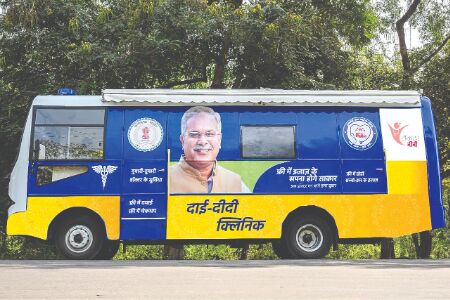Chhattisgarh government takes series of initiatives to better lives of people

Raipur: The Government of Chhattisgarh has set forth to fulfill its promise of providing land holding rights to the landless urban population through a legislation, under which, the people who had been in possession of the land parcel prior to November 19, 2018, are being given land ownership rights. Through this landmark decision, more than two lakh underprivileged urban families of the state will be benefited directly. Moreover, under the Mor Zameen-Mor Makaan scheme, they shall also be entitled to receive a direct financial assistance up to 2.5 lakhs for fulfilling their dreams of becoming a pucca house owner.
Representation for the Divyangjan
To provide adequate representation to the Divyangjan, the Government of Chhattisgarh went ahead to change their Municipal acts of 1956 and 1961 and made sure that this vulnerable section of the society got its voice in the third tier of the Government through reservations for the posts of Aldermen in the ULBs.
Boost to beneficiary led Urban Housing
Since the inception of the PMAY (Urban) in June 2015 to formation of the new Government in the State in December 2018, only 8,000 Dwelling Units were completed. The State then changed their strategy focusing on providing direct financial assistance to the Urban Poor instead of the age-old contractor-based model. With this paradigm shift, more than 80,000 Dwelling Units have been successfully completed till date.
Leading the nation in Urban Sanitation
When the Government came up with the Narwa-Garua-Ghuwa-Badi model, critics believed that it was a model fit for only the Rural areas, only to be left surprised when Chhattisgarh bagged the prestigious title of being the cleanest state in the country in the biggest sanitation competition of the world, Swachh Survekshan, and not just once, but twice. The amalgamation of the traditional ways of scientifically disposing municipal solid wastes with the use of the right ICT tools, the Chhattisgarh sanitation model paved its way to being recognized by the NGT as the most economical and appropriate model for tier 2 and 3 cities of the nation. The Hon. Chief Minister believes that the Chhattisgarh Sanitation model is successful only because it keeps citizens at the forefront, not just as end users but also as important stakeholders. The model also generated assured livelihood for 10,000 plus women SHG members.
Small cities, big laurels - In the Swachh Survekshan 2020, it was not only the state which performed exceptionally well but also the towns of Chhattisgarh. Nagar Panchayat Patan attained the status of being the cleanest city in the country in less than 25 thousand population category. Similarly, Jashpur and Dhamtari won national fame under the categories of towns with population of 25 to 50 thousand category and of 50 thousand to 1 lakh. Ambikapur retained the status of being the cleanest city in the population range of 1 to 10 lakh.
Transforming Urban Health
The Urban poor, during inclement weather and seasonal illness, were always faced with the dilemma of choosing between losing a days wage and going to the hospital and paying a hefty fee. The Government believed it had to change this and launched the ambitious 'Mukhyamantri Slum Swasthya Yojna'. Under the scheme, 120 modern, all equipped Mobile Medical Units reach the Urban Slums at a time suitable to the local population. These MMUS, led by professional, specialist doctors, provide free consultation, diagnostic services and medicines to any and everyone. This scheme has not only provided free, quality medical care to the needy, but have also reduced the stress at the secondary and tertiary health care facilities. In just 5 weeks, over 100,000 people have been benefited with this game changer of a scheme.
Women powered, women focused urban health
In addition to the MMUs under MMSSY, the government has also launched the women special 'Dai Didi Clinics', which are run by women doctors, lab technicians and pharmacists, reserved only for women. These women special MMUs, apart from providing the mandated consultations, lab tests and medicines, are also equipped with sanitary pad dispensers, provide health supplements to the pregnant women, aid in family planning and help in fighting malnutrition.



